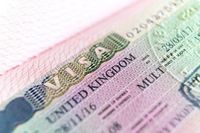LONDON – The United Kingdom government is poised to significantly increase visa fees for almost all foreigners, according to an announcement made by the Home Office. These changes will come into effect on April 9th, 2025, and are set to impact a vast range of visa applications, sponsorship fees, and other immigration-related documentation.
The fee for a standard UK visit visa, valid for six months, will rise from £115 to £127, marking a substantial 10% increase. Likewise, the fee for a visit visa encompassing a two-year duration will increase from £432 to £475. Additionally, the costs for five-year and ten-year visit visas will also see hikes of £77 and £96 respectively.
Moreover, the fee for the Electronic Travel Authorization (ETA) is set to rise by £6, bringing the new cost to £16. This adjustment is part of broader changes that will also affect various work visas. For international students, the visa fee will increase by £34 to reach £524 starting on the same date.
The modifications extend to a wide array of sponsorship categories, including the Student Sponsor License and Worker Sponsor License. The fee for Naturalisation as a British citizen will also increase, jumping from £1,500 to £1,605.
A key point of contention is the Certificate of Sponsorship (CoS) fees for Skilled Workers, which are scheduled to see the largest increase. For instance, fees for the CoS covering Skilled Workers will escalate sharply, going from £239 to £525 for a duration exceeding 12 months. In terms of Skilled Worker applications, those applying from outside the UK for three years will now face a fee of £769, whereas those applying for five years will see an increase to £1,519.
For those already within the UK, the fees for three-year applications will climb from £827 to £885, while five-year applications will increase from £1,636 to a new total of £1,751. These increments reveal a clear trend of rising costs associated with the immigration process.
The adjustment is not limited to work visas; the fees related to various types of immigration and visa applications will see approximately a 7% increase overall. For instance, the fee related to private medical treatment visas is expected to rise from £200 to £220.
On March 19th, the Home Office made this announcement, emphasizing the substantial shifts. According to Shara Pledger, a notable immigration law expert at Pinsent Masons, organizations will need to adjust their recruitment budgets to accommodate these changes. Pledger remarked on the necessity of these amendments stating, "These increases mean higher costs for businesses sponsoring workers and greater financial burdens for migrants settling in the UK."
The changes will also affect various other visa categories, including the recently popular Innovator Founder and Start-up visas. For Innovator Founders, the fee will increase from £1,191 to £1,274, while the Start-up visa fee will rise from £435 to £465. Furthermore, applicants for the Global Talent visa will face increased fees as well, with charges for main applicants requiring an approval letter going from £192 to £205. For those who do not require an approval letter, costs will rise from £716 to £766.
The fee adjustments come as part of the government’s ongoing efforts to manage immigration and cover the costs associated with processing applications adequately. Importantly, these increases furnish the backdrop for ongoing discussions surrounding the UK's immigration policies, especially under a climate of tightening rules and heightened scrutiny on compliance by sponsors.
The Home Office's latest Statement of Changes has particularly important implications for arriving migrants, highlighting that from April 9 onwards, certain payments will need to be factored into whether an employee’s salary meets the required minimum threshold for skilled worker visas. This includes deductions from salary related to visa and immigration costs, meaning employers must consider their responsibilities more rigorously.
As these new fees loom, there is palpable concern in the business sector regarding the financial strain that increased immigration fees will impose. Employers will have to re-evaluate their current and future recruitment strategies, particularly as the cost of sponsoring workers begins to accumulate. The sentiment in certain circles is that the rise in charges may discourage prospective migrants and place further financial hurdles on individuals and families seeking to establish their lives in the UK.
For those currently navigating the UK's immigration pathways, these changed fee structures signify not just higher costs but also a tightening grip on immigration that could deter newcomers. As the UK continues to balance immigration control with the need for skilled labor, this latest move represents a significant shift, reflecting the government's ongoing attempts to reevaluate its immigration framework effectively. For those affected, a comprehensive breakdown of all new fees is available on the UK government’s official website, detailing the implications of each fee revision.





